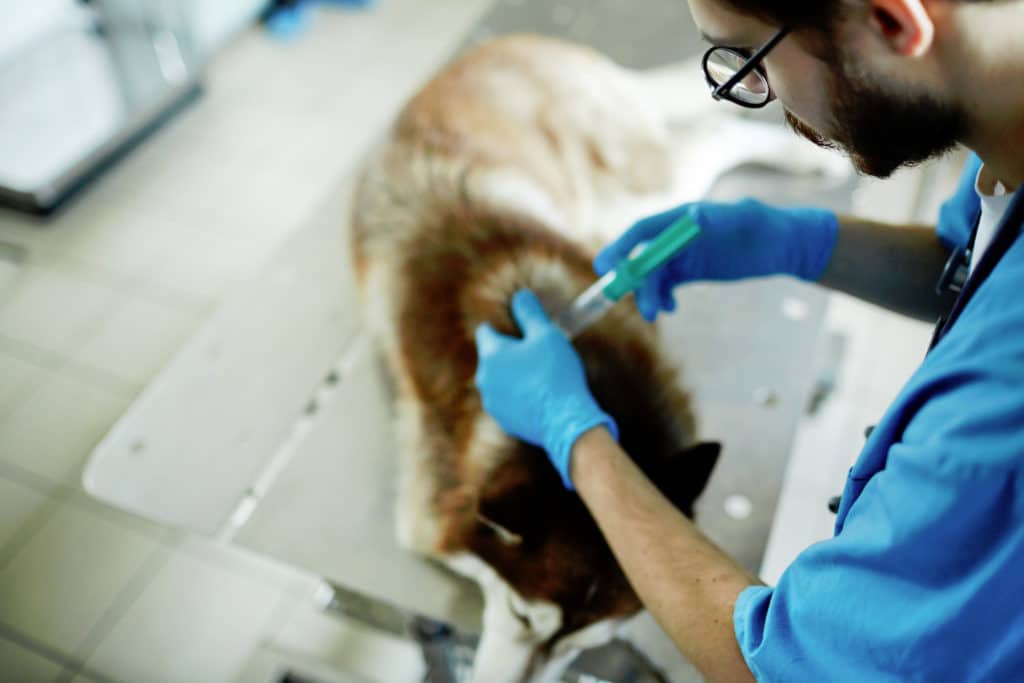Heartworm (also known as Dirofilaria immitis) is an intestinal parasite common in dogs, cats, and ferrets. But other animals can also be affected by this worm. If not treated properly, this parasite can even cause the death of your loving pet. A heartworm test could save your pet’s life if it can be done before things get worse.
Table of Contents
What is Heartworm Disease (or Dirofilaria immitis)
Heartworm disease is a severe issue for dogs, cats, and ferrets. This can cause heart failure, acute lung disease, other organ damage, and even death. This complication is caused by a parasitic worm named “Dirofilaria Immitis.” These worms can be spread into a dog’s system through a mosquito bite. A doggo’s body is a definite and ideal host for these worms. So they would mature into adults and mate inside the dog’s body and produce offspring and spread throughout the body. The worm does not affect the mosquito since it’s an intermediate host for the worm. So the worms would live inside a mosquito for only a short amount of period to become infective.
If you like to learn more about heartworms by watching a video, you can watch this video.
Symptoms on your dog if it has Heartworm Disease
Early-Stage symptoms of Heartworm Disease of Dogs
If your doggo is suffering fromthe early stage of Dirofilaria immitis (heartworms), they will show these signs and symptoms.
- Weight Loss
If heartworms are being spread throughout the dog’s body, they’d require lots of energy, and that energy will be taken from the host’s body (in this case, it’s your dog). This will result in rapid weight loss of your dog even if they eat food more and more.
- Persistent Cough
Regular coughs or kennel coughs are strong and occasional. But heartworm related coughs are usually dry and frequent. In the early stages, even a tiny amount of exercise can cause a dry cough. This is due to heartworm parasites making their way into your dog’s lungs and creating discomfort and blockages.
- Inactive
Your dog may lose interest in going for a walk or being active all of a sudden. This can be a sign of heartworms. If the condition gets severe, any kind of physical activity can be extremely difficult for your dog.
Middle-Stage Symptoms of Heartworm Disease on Dogs
If the issue is not treaded at this level, then heartworms inside your doggo’s system will get matured. When this happens, they will inhabit your dog’s veins and lungs. This will cause severe blockage, and that will lead to these symptoms.

- Bulging Ribs
In this stage, fluid can fill your dog’s lungs. Due to this, your dog’s ribs may look stick out. These ribs also might have a swelled look due to weight loss.
- Difficulty Breathing
Your dog can have asthma attacks due to heartworm disease. This is because, in this stage, fluid may build around the blood vessels in the lungs. This can make it difficult for the lungs to allocate oxygen to the bloodstream. When this happens, your dog can have asthma attacks.
Late-Stage Symptoms of Heartworm Disease on Dogs
When this stage occurs, your doggo’s dry cough, lack of appetite, and inactiveness would be severe. On top of that, these symptoms will also emerge from your dog.
- Heart Murmurs (sound)
The heart will produce a “murmur” sound when beating. This sound can be heard from a stethoscope. This happens at the late stage of heartworm disease, and if this happens, it can cause heart enlargement, and heart failure which can be fatal.
You can learn more about heart murmurs from this link.
- An enlarged Liver
At this stage, your dog’s liver will be larger than usual. This is due to heartworm infection in the liver. This can result in liver failure and can even cause death.
- Abnormal sounds within the dog’s lungs
Your dog’s lungs will produce abnormal sounds. This is because, at this stage, your dog’s lungs can be filled with fluids. This can enlarge the lungs and can even lead to lung failure. If that happens, it would be fetal.

How to test for Heartworm Disease
There are different kinds of Heartworm tests that can be done to detect adult heartworms.
- Heartworm Antigen Test
This is one of the main methods of detecting adult heartworm infection in dogs. This test is explicitly built to detect “adult female heartworms.” The antigen can detect 6.5 – 7 months after infection. Antigen test will have positive results even if only 1 – 3 adult females are infected in the heart. You can get the results of this antigen test immediately.
But keep in mind that antigen heartworm tests can have false negatives under these circumstances.
- If there are no matured female worms (only male worms or immature female worms)
- If the number of worms are lower (antigen can’t detect worms if the number of worms is lower)
- If the infection has happened in less than 5 months (in this case, the dog is already infected, but it’s too soon to be positive in an antigen heartworm test)
- If there are technical difficulties while doing the antigen heartworm test, it can be false negative (If this happens, the heartworm test should be done again).
- Testing for Microfilariae
If the antigen test is positive or weakly positive, that should be followed by a test for microfilariae. The detection of microfilariae will confirm that there are already matured adult worms living in the dog’s heart. That will tell us that specific treatment should be taken to kill microfilariae. The best test to detect microfilariae is called “The Concentration Test.” The most preferred test to detect microfilariae is “Modified Knott’s test.” The modified Knott’s test uses a centrifuge that quickly spins the sample in a small circle and concentrates the microfilariae.
There is another standard test to detect microfilariae called the “filter test.” In this test, the sample will pass through a series of excellent filters that trap microfilariae. In all these tests, microfilariae can be captured and detected using a microscope.
But keep in mind that testing for microfilaria test can be falsely negative for these reasons.
- All adult worms are of the same sex. Therefore, mating cannot occur.
- There are too few microfilariae in the bloodstream to be detected (heartworm mating has just begun, or there are only a few adult worms to produce microfilariae)
- None of the adult worms inside the dog’s system are mature enough to produce microfilariae while mating.
- DNA-PCR test

In this heartworm test, we detect the DNA of the heartworm. But this is not yet sensitive enough to screen dogs for heartworm infections. But, if microfilariae can be found in the dog’s system and if there is any doubt about their identity, then this heartworm test can confirm that they are indeed “Dirofilaria immitis” and not any other kind of blood parasite.
- X-rays (Radiographs)
If an X-ray of a dog with heartworm disease is taken, it will show heart enlargement (the heart has become more prominent than usual). It may also show swelling of the large artery called the pulmonary artery that connects the heart to the lungs. If these signs are shown in an X-ray, they are considered hypothetical evidence of heartworm disease. However, X-rays might also show the condition of the lungs, heart, and pulmonary vessels. These data can provide valuable information regarding possible complications related to treatment.
- ECG or EKG (Electrocardiogram)
The heart generates electric currents. We can trace that electric current, and that is called an electrocardiogram. An electrocardiogram can show us if there are any abnormalities of the rhythm of the heart. This will help detect any enlargements in chambers of the heart, and that can help determine if the doggo can safely go through treatment for heartworms.
- Ultrasound of the heart (echocardiography)
Ultrasound of the heart will tell us if the heart is pumping the usual amount of blood and give us a general status of the heart. For example, if there are heartworms inside your dog’s heart, this echocardiography will tell that the heart is not functioning correctly. This information will also be helpful to determine if the dog can undergo heartworm treatment procedure.
Do all dogs need to have a heartworm test?
The short answer is NO. Puppies less than 6 months of age don’t have to be tested since adult worms are not present in their bodies at this age. Therefore, both antigen tests and microfilariae tests will come as negative. But it’s always a good practice to check for signs from the early stage as mentioned above, such as being inactive, sudden weight loss, and persistent cough.

How to prevent Heartworm Disease
There are 3 essential things you can do to prevent Heartworm Disease. Follow them, and your doggo will be safe from this deadly disease.
- Use Heartworm Preventative Medicine
Your veterinarian can give your doggo heartworm preventative medication that can kill the heartworm larvae if it ends up infecting your precious doggo. There are various types of medicine to prevent heartworm disease.
There is a monthly topical medication that comes with a tube. It needs to be inserted into the back of your doggo. Or, you can choose the injectable product. This will last up to six months. There are also oral tablets which have to be given monthly.
- Give your doggo the best food
Home-cooked meals are the best for your dog. But sometimes, it can be a difficult task to cook all the meals for your dog at home. But don’t worry. If that happens, you can still find the best dog food from the store. Keep in mind to check for dog food that has whole food ingredients. You should also check for determinable listing for vegetables, carbohydrates, and protein on the dog food.
- Do regular checkups for your doggo.
Always make sure that you take your doggo to a vet to have a complete checkup at least once a year. By doing this, your vet can give your dog a complete physical checkup and check for signs and symptoms of heartworms or any other parasites that you might have missed.
How to treat Heartworm Disease
The primary treatment to kill adult heartworms is using an injectable drug. It’s called “Melarsomine” (brand name is Immiticide®), and it’s given to kill adult heartworms in the heart and adjacent vessels. This drug will be administered to a dog as a series of injections. The vet will decide the needed schedule according to your doggo’s condition. Usually, most dogs get an initial injection followed by 30 day period of rest and two more injections after that are given 24 hours apart. This treatment could usually cost around USD 350 to USD 1,000 depending on the weight of your doggo.
You can find out more information about this treatment procedure from this link.
Most dogs will also get administered antibiotics such as “Doxycycline” to fight potential infection with bacteria like “Wolbachia” that can inhabit heartworms.

FAQ
- Is there are any heartworm test kits for Dogs?
Yes, there are antigen heartworm test kits for dogs. You can test your dog for heartworm disease at home by using this kit. You can buy them using this link.
- What is SNAP heartworm test?
SNAP canine heartworm antigen test kit is a test kit that is used to detect heartworms in a dog’s system. There are specific guidelines in using the SNAP heartworm test, and it’s for veterinary use only. You can learn more about the SNAP heartworm test using this link.
- Chances of a dog getting heartworms
A study has shown that 250,000 dogs have gotten heartworms out of 50,000,000 (fifty million). So mathematically, one in every 200 dogs would become infected every year.
- What does heartworm look like in poop?
You can’t observe heartworms in your dog’s poop. The reason for this is that heartworms don’t live in the gastrointestinal tract. As mentioned above, heartworms mostly live in the heart and lungs of your dog. So if you can see worms in your dog’s poop, it’s most likely hookworms or roundworms.
- Can I give my dog heartworm medicine without testing?
NO. The American Heartworm Society suggests that it’s essential never to give Heartgard or any medication to pets that have not been tested for heartworm disease since there can be severe side effects. They also recommend annual heartworm testing. If you take your doggo to a vet regularly, you don’t have to worry about it.
- Do indoor dogs need heartworm prevention?
Absolutely. Any dog has a risk of getting infected by heartworms. So, it doesn’t matter if your dog is an indoor dog or not, your dog should get tested for heartworms, and you should do everything to prevent your dog from getting infected.



Pingback: Why Is My Puppy Breathing Fast? A Simple Guide.
Pingback: Tick Fever in Dogs: Everything to know and how to prevent it